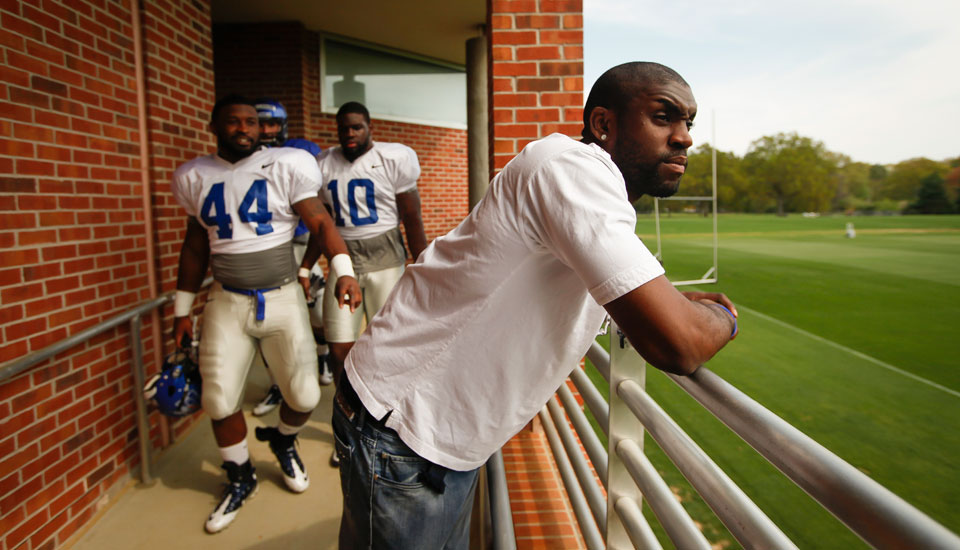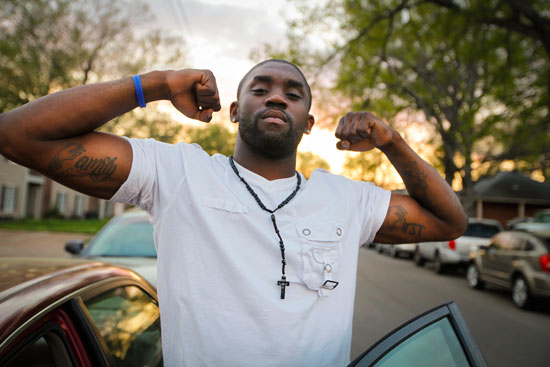From Chronicle of Higher Education:
He hid them in a shoebox under his bed. “My own little secret,” he said.
Inside the box, he kept 10 thin paperbacks he was given as a child. For years he didn’t touch them. But as he reached 19, they became a lifeline.
Each night after dinner, he closed his dorm-room door, reached under his bed, and opened the box. Resting his head against the blanket his grandmother had made him, he pulled out the books: “First Grade, Level 1, Ages 6-7.”
Quietly, so none of his teammates would hear, he read aloud, moving his finger across the page.

***
The words are tattooed on his arms: “Family First.” But 23-year-old Dasmine Cathey looks after far more people than that. A buddy who just spent four years in jail. A local gang leader looking to join a church. A friend of a friend who had lost a brother. They all remind him a little bit of himself: abandoned at some point by family or friends, too weak to stand up for themselves.
 Among Dasmine Cathey’s tattoos are two prominent words: “Family First.” It’s a reflection of his many commitments outside college.
Among Dasmine Cathey’s tattoos are two prominent words: “Family First.” It’s a reflection of his many commitments outside college.Most mornings the University of Memphis football player rises just after 5 to drive one of those friends to work. He pushes his 6-foot-4 frame up from the recliner he sleeps in, steps quietly past his brother resting on the couch beside him, and readies himself for the day ahead.
On this day, a cloudy Wednesday in late February, he climbs into a beat-up van parked on the front lawn and drives up the road to fill the tank with just enough gas to make it through the morning. By early afternoon, when his first class of the day meets, the fifth-year senior will have logged more than 50 miles shuttling family members and friends to where they need to be.
Unfortunately for Mr. Cathey, all of that motion has not helped him get where he needs to be. With less than three months until graduation, he hasn’t shown up for classes in weeks. Last semester, during his final season of football, he failed three courses. That dropped his GPA below the 2.0 required to complete a degree, putting extra pressure on this semester’s grades.
On paper, three classes are all he has left. But for a guy who could barely read three years ago, every class is a mountain.
***
Growing up, Dasmine Cathey hated everything about school—reading, writing, even the smell of books. To him, school was nothing but a needless burden. Once you learned about your ancestors and your heritage, he figured, what else did you need to know?
He still remembers the day a middle-school teacher asked him to read aloud in class. As he mumbled through, clearing his throat on words he didn’t understand, he heard snickers around him. “How can you be so good at sports but so dumb in school?” a classmate asked.
His sixth-grade teacher suggested he enroll in a tutoring program to overcome his reading problems. Mr. Cathey’s parents didn’t have enough money, so an aunt helped cover the cost. He took classes for two or three months before dropping out. “You need the money more than me,” he told his mother.
By high school he still hadn’t read a single book. It took him hours to wade through a handful of pages, and by then he’d forgotten most of what he’d read. But outside of class, things were looking up. He was a finalist for Tennessee Lineman of the Year in football and played on a state-champion basketball team at Ridgeway High, in suburban Memphis. And so he got a pass. Few people seemed to care if he was learning.
If not for football, and his hope of one day playing professionally, he never would have set foot in a college classroom. He had offers from other colleges, but he stayed close to home so his mom could watch him play. His first year, there wasn’t much to see. His poor high-school grades and test scores forced him to sit out the whole season. Without his sport, he felt lost.
It was the job of Joseph P. Luckey, and the university’s eight-person team of academic advisers, to get him eligible to play.
To read more, click here.



Dasmine Cathey Reflects on His Moment in the Spotlight
June 12, 2012, 12:53 pm
By Brad Wolverton
“The Education of Dasmine Cathey”—a recent Chronicle story about a fifth-year senior at the University of Memphis who started college with severe reading challenges and is just a few credits away from a degree—stirred up strong feelings on many issues. Among them were questions about the shortcomings of elementary and secondary education, access to college, academic rigor, and the role of counselors in helping the least-prepared students.
I heard feedback on the article from many of those counselors last weekend, at the annual convention of the National Association of Academic Advisors for Athletics. And while I certainly didn’t hear from everyone, one common response went like this:
“The problem is, we’ve all got that person on our campus,” said one director of academic support at a major public university. “We just don’t want anyone to know.”
Readers and commentators responded to the article in forums as varied as Metafilter, Deadspin, and The New York Times. Most viewed Cathey as a sympathetic figure who was a victim of his circumstances.
“Damn,” one commenter wrote. “Hats off to him for his perseverance and attitude.” Others congratulated him for his courage. “Your story will be an inspiration to hundreds if not thousands of youth in this city and surrounding area,” one Memphis man wrote.
When the article came out, Cathey seemed to enjoy the limelight. He directed friends to read the piece, and sent me a note of thanks. In a phone conversation, he told me that, by opening up about the challenges he had kept inside for so long, he felt a big weight had been lifted off his shoulders.
But some of Cathey’s family members didn’t think the story accurately portrayed their financial situation. They may not have a lot of money, but they don’t see themselves as poor. And as you might expect from a guy who has spent much of his life taking care of the people around him, their concerns upset him.
“Never meant to hurt my family,” he wrote on Facebook.
But if he had it to do over, he told me, he would have described the situation in just the same way. As for the story, he said, “I wouldn’t change a single word.”
He didn’t feel the same about the column that Joe Nocera wrote about him in Saturday’s New York Times. That article gave him credit for helping his family and improving his reading. But in describing Cathey’s academic papers, Nocera said they seemed “more like the work of a seventh grader than a college student.”
The ending didn’t sit well with Cathey, either. Nocera congratulated him on learning to read, to which the 23-year-old said: “Thanks. The thing I have to work on now is understanding what I’m reading.”
Cathey wrote me an e-mail that morning, saying that he was having “bad feelings” about the Times article. “They’re making it seem like I’m stupid for teaching myself to read,” he said.
When we talked by phone a little while later, he was trying to remain upbeat. “It’ll be all right,” he said. Then we chatted about some radio and television interviews people wanted to do with him, and a local newspaper reporter who had called.
Cathey’s reaction to the situation reminded me of a moment he and I shared when I was in Memphis a few months ago. I was recording him talking about his struggles overcoming reading and other challenges, and I asked him how he gets himself through rough spots.
Whenever things seem too hard, he said, he listens to a song that always cheers him up.
“What’s that song? How’s it go?” I asked. This was his response:
This entry was posted in Academic Services, Big East, Memphis Tigers, N4A, National Association of Academic Advisors for Athletics, NCAA. Bookmark the permalink.